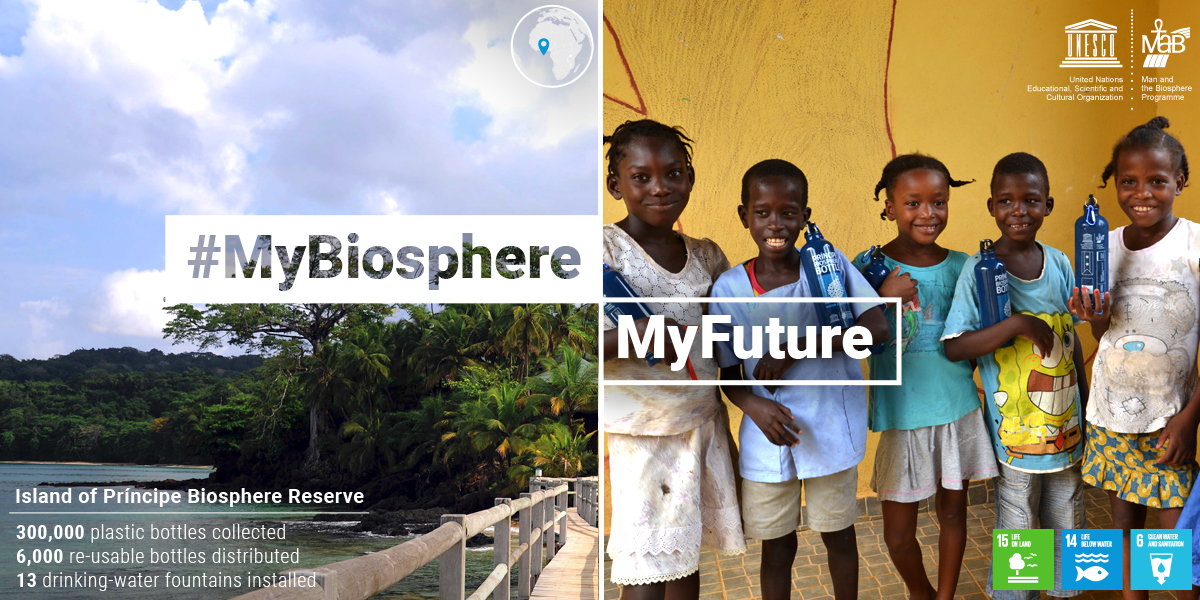“No Plastic” campaign protects marine life in Principe
Disposable plastic bottles are common on the Island of Príncipe Biosphere Reserve, where tap water is not always safe to drink. This generates tons of plastic waste each year and, without a collection system in place, many discarded bottles find their way to the ocean, where they put the island’s exceptional marine-life at risk. The initiative, “No plastic. A small gesture in our hands”, is mobilizing the local population to get the plastic out of the ecosystem, while improving their access to safe water. This type of grassroots effort for sustainable development represents the aspirations of UNESCO’s World Network of Biosphere Reserves, which are reflected in the Organization’s My Biosphere, My Future campaign (#MyBiosphere) that was launched at the 4th World Congress of Biosphere Reserves in Lima this week.
The Island of Príncipe is one of the three oceanic volcanic islands of the Gulf of Guinea, characterized by its mountain peaks, primary rainforest, sandy beaches and coral reefs. It was designated as a Biosphere Reserve by the Man and Biosphere Programme (UNESCO-MAB) in 2012 in recognition of its rich biodiversity and its importance as a nesting area for sea turtles, seabirds and cetaceans, and of its leadership in the promotion of integrated eco-tourism development. Since the main economic activities are agriculture, fishing and tourism, both the marine life and pristine environment of the island are valued assets.
The “No Plastic” campaign invites the entire population of the island (about 7,000 people) to collect plastic bottles and exchange them for reusable, stainless steel “Principe Biosphere Bottles”. Fifty plastic bottles can be traded for a reusable one. Once collected, the plastic bottles are compacted and shipped to facilities where they can be recycled or disposed accordingly.
In parallel, 13 safe freshwater fountains were installed in public spaces around the island, including schools, markets, public administration buildings and the airport. Children take their Principe Biosphere Bottles to school and refill them there. Local managers were trained to maintain the fountains’ filtering system.

Photos: António Domingos Abreu. Design: UNESCO
Launched in 2014, the campaign has been hugely successful, with over 300,000 disposable bottles collected and 6,000 Principe Biosphere Bottles distributed. The campaign targets children as future advocates for a healthy environment, with awareness activities in school. Training sessions were organized for teachers and members of the community. Its five-year goal is to declare the Island of Principe free of plastic. To this end, the Regional Assembly is also working to develop legislation to tax plastic imports.
This initiative was developed by local managers in partnership with UNESCO-MAB, the Spanish Ministry of Agriculture, Food and the Environment and the HBD group. The World Network of Biosphere Reserves comprises 651 sites in 120 countries. The Network is meeting in Lima, Peru, on 14-17 March 2016 to develop an Action Plan for biosphere reserves over the next 10 years.
This initiative contributes to the following Sustainable Development Goals:
- Goal 15. Protect, restore and promote sustainable use of terrestrial ecosystems, sustainably manage forests, combat desertification, and halt and reverse land degradation and halt biodiversity loss
- Goal 14. Conserve and sustainably use the oceans, seas and marine resources for sustainable development
- Goal 6. Ensure availability and sustainable management of water and sanitation for all
Related links:
- No plastic. A small gesture in our hands
- Island of Principe Biosphere Reserve
- Follow the Island of Principe Biosphere Reserve on Facebook
- 4th World Congress of Biosphere Reserves
(14-17 March 2016, Lima, Peru) - World Network of Biosphere Reserves
<- Back to: All news



